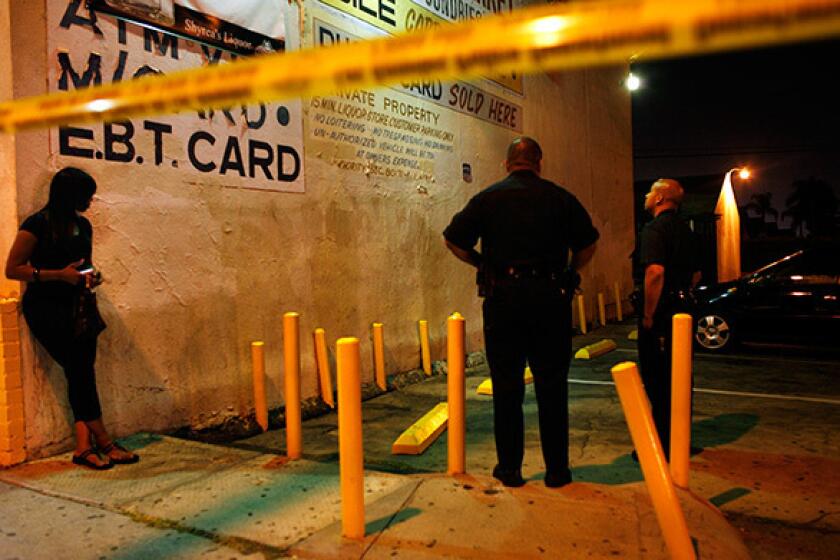Man sentenced to prison for selling meth while on supervised release after terrorism conviction

- Share via
An Orange County man was sentenced to more than 15 years in federal prison Monday for selling methamphetamine to an undercover FBI employee while he was on supervised release following a 2009 terrorism conviction.
Ahmed Binyamin Alasiri, 45, of Garden Grove received a 15-year, eight-month sentence from U.S. District Judge Cormac J. Carney as well as a two-year sentence for violating the terms of his supervised release, according to the U.S. attorney’s office for the Central District of California. The two sentences will run concurrently.
Alasiri pleaded guilty in October to one count of distribution of methamphetamine, prosecutors said, the most recent case in a criminal history that stretches back over three decades.
According to a sentencing memo filed March 14, Alasiri sold 1.7 kilograms of meth to an undercover FBI employee on three occasions about a year after he was released from prison on the terrorism charge.
In 2007, Alasiri, who was known at the time as Kevin Lamar James, pleaded guilty to one count of conspiracy to levy war against the United States government through terrorism, according to a criminal complaint for the meth case, which was filed Aug. 20, 2020.
“Alasiri admitted to conspiring with others to engage in violence against the governments of the United States and Israel by attacking targets in Southern California associated with the U.S. military and the Jewish religion,” the complaint stated.
His co-conspirators robbed gas stations to raise money for attacks Alasari planned on U.S. military operations and Israeli and Jewish facilities in Southern California, prosecutors said.
In 2009, Carney sentenced Alasiri to 16 years in federal prison followed by three years of supervised release, according to the complaint. U.S. Bureau of Prisons records showed that he served the last five years at the “supermax” federal prison in Florence, Colo., which has held prisoners such as Unabomber Theodore Kaczynski and Boston Marathon bomber Dzhokhar Tsarnaev.
Students here don’t do fire safety drills, they do escaped-prisoner training — closing blinds, hiding in a corner or closet.
Alasiri was released to a halfway house in Garden Grove in 2019 to serve his three years of supervised release, and he “immediately began violating rules, ultimately resulting in court-ordered enhanced supervised release conditions,” according to the memo.
On Nov. 7, 2019, the Orange County Superior Court granted his petition to formally change his name to Ahmed Binyamin Alasiri, the complaint stated.
On July 24, 2020, Alasiri sold the undercover buyer 430 grams of meth for $3,700, prosecutors said. The second sale, in which he sold the buyer 435 grams of meth for $3,700, occurred on Aug. 6 that year.
The third sale occurred Aug. 20, prosecutors said. Alasiri sold the buyer 877 grams of meth for $7,400.
Alasiri “was industrious and obtained legitimate full-time employment, yet he did not hesitate to traffic in drugs to earn income,” prosecutors said in a sentencing memorandum.
He admitted in his plea agreement that he first raised the topic of selling drugs, and he said that he had family members who were drug traffickers and that he sold drugs to customers, prosecutors said.
“I have connections to every single drug you can imagine,” he said, according to the memo.
A ‘trivial’ dispute between two former allies turns deadly, threatening an area’s turnaround.
Alasiri was raised by a single mother on Hoover Street in South L.A., the birthplace of the Hoover Crips, according to the memo, and joined the gang at 11 years old after being attacked at school by a rival gang member who assumed “he was already a Hoover.”
“It appears that gang membership in his neighborhood was essential for survival,” the memo said.
Alasiri was arrested and detained multiple times as a juvenile, and prosecutors pointed to his childhood circumstances in their sentencing memo.
“A review of defendant’s personal history reveals a life lived in the extremes: extreme childhood circumstances, extreme criminal and violative conduct, and extreme efforts to succeed when out of custody,” they wrote.
They argued that a sentence on the low end of the federal guideline range would be appropriate.
More to Read
Sign up for Essential California
The most important California stories and recommendations in your inbox every morning.
You may occasionally receive promotional content from the Los Angeles Times.












